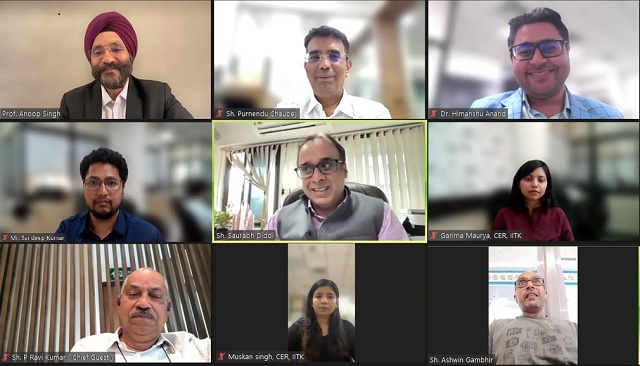Kanpur, 13 March, 2025: The Centre for Energy Regulation (CER) at the Indian Institute of Technology Kanpur (IITK) successfully hosted the 6th Regulatory Conclave on Energy Transition and Framework for Renewable Purchase Obligation (RPO). Chaired by Mr. P. Ravi Kumar, I.A.S (Retd.), Chairman, Karnataka Electricity Regulatory Commission (KERC), the virtual conclave was attended by more than 250 participants from various professional backgrounds including policymakers, regulatory authorities, non-governmental organizations and officers of government and private sector.

Emphasizing the significance of the conclave’s objectives, Prof. Anoop Singh, Founder & Coordinator of the Centre for Energy Regulation and Energy Analytics Lab at the Department of Management Sciences (DoMS), stated, “The Renewable Purchase Obligation framework represents a cornerstone of India's energy transition strategy. As we navigate the complex path toward our national renewable energy targets, we must address the implementation challenges obligated entities face while creating a supportive ecosystem for compliance. This conclave brings together diverse perspectives from policy, regulatory, and industry domains to collectively strengthen the RPO mechanism, to support energy transition in the Indian power sector. Through collaborative dialogue, we aim to identify actionable solutions that balance regulatory oversight with market-based approaches to accelerate India's renewable energy adoption. We propose REC–based Unified RPO Compliance Framework and multiplier-based fungibility for RPO targets across categories of RE sources."
The discussions at the conclave focused on India's ambitious renewable energy commitments and the role of RPO framework in facilitating a seamless energy transition. The panel members discussed the challenges faced by obligated entities in fulfilling their RPO mandates, assessed the impact of emerging technologies, and explored policy interventions necessary for reinforcing the RPO framework. The deliberations revolved around regulatory and policy challenges covering RPO definition, transparency and visibility of RE generation and framework for RPO compliance, market-based solutions like Renewable Energy Certificates (RECs), and the effectiveness of penalty mechanisms in ensuring RPO Compliance.
Distinguished panelists included Mr. Jeevan Kumar Jethani, Senior Director/ Scientist-F, Ministry of New & Renewable Energy (MNRE); Mr. Saurabh Diddi, Director, Bureau of Energy Efficiency (BEE); Mr. Purnendu Chaubey, Senior Vice President, ReNew; and Mr. Ashwin Gambhir, Fellow, Prayas (Energy Group).
About the Centre for Energy Regulation (CER), IIT Kanpur
The Centre for Energy Regulation (CER) at IIT Kanpur, housed within the Department of Management Sciences (DoMS), was established with support from the UK's Foreign, Commonwealth & Development Office (FCDO). CER is actively engaged in regulatory research, capacity building, and knowledge dissemination, fostering collaboration among regulatory bodies, utilities, and other stakeholders to drive sustainable power sector reforms.
The Power Sector Reforms (PSR) Programme - Phase II, supported by FCDO under the INDIA-UK Partnering for Accelerated Climate Transitions initiative, focuses on regulatory research, capacity building, and policy interventions to support India's clean energy transition.
This conclave is expected to provide valuable insights into India's renewable energy policies and facilitate discussions on strengthening the RPO framework to meet the country's decarbonization targets.
For more details, visit: https://cer.iitk.ac.in/
About IIT Kanpur:
Indian Institute of Technology Kanpur was established in 1959 and declared to be an Institute of National Importance by the Government of India through an Act of Parliament. IIT Kanpur is best known for the highest standard of education in science and engineering and for seminal R&D contributions over the years. The institute has a sprawling lush green campus spread over 1050 acres with a large pool of academic and research resources spanning across 19 departments, 25 centres and 3 interdisciplinary programs in engineering, science, design, humanities, and management disciplines with more than 580 full-time faculty members and approximately 9000 students.
For more information, visit www.iitk.ac.in.











